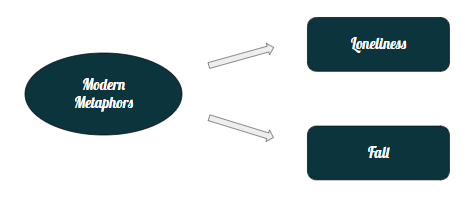Welcome readers,
Try to read the above-mentioned lines and check your comprehending capacity whether these words create coherent thoughts or central perspective in your mind? Try to look for images and create a scene or imagery of words, try to grasp what the lines have to say. Um, is it getting difficult? Is it not making a particular sense? Does it have unclear or vague implications?
If your answer is yes, then you will come to know what exactly I am trying to say. This obscurity and vagueness give these kinds of lines as the quality of the modernist text. Modernist literature really is governed by esotericism. Esotericism is one of the special features of modernist poetry. So these Modernist poetries are intended to be understood by a small number of people with special kind of knowledge and intellect.
“In the first fifty years of the twentieth century, the human race moved through a remarkable series of upheavals than during perhaps the fifty generations in the past.”
Similarly, the form of literature also moved faster towards fragmentation and disillusionment than perhaps the fifty generations' literature in the past.
The whole problem of obscurity in modern poetry was raised in it's more acute form by the publication of this poem called 'The Waste Land'.
In this blog, I am going to record some of the metaphors explained in some very short modernist poetry.
MODERNIST POETRY-
Let's see some of the modernist poems and observe the metaphors and language adapted by poets.
1) “The Embankment” by T.E Hulme
Hulme, often considered as the father of 'Imagism', offers a fantastical tale of ‘fallen gentlemen’ - a modern man who compromised the everlasting happiness in worldly and momentary pleasures like that in gatherings and people. This fallen gentleman provides insight into modern metaphor.
"Degradation of mankind"
2) “Darkness” by Joseph Campbell
Joseph Campbell in his poem, the ‘Darkness’ offers a pessimist metaphor or theme which the title itself reveals. He says he sees a star which no longer appears as a star. And so nothing is left for admiration and he passes. This poem presents a characteristic feature of modernism as it is noted by Ward in his chapter 'The Setting' that intellectual writers and poets turned themselves to high literature because they didn't found anything worth admiring in society so they just saw and passed.
3) “Image” by Edward Storer
Edward Storer, in his a haiku kind of poem provides an insight to the forsaken lovers or abundant lovers. I think the moon can be considered as a metaphor in this poem. An adjective is attributed to the moon - 'chaste white moon' indirectly symbolising purity but it can also be assumed that 'chaste white moon' may be a satirical remark from the poet symbolizing heaviness of isolation. They are pure but they are facing hardships and drought-like life.
4) “In a Station of the Metro” by Ezra Pound
Ezra Pound’ poem, ‘In a Station of a Metro', tries to compare the rush at the station and particularly highlighting the petals on a black bought as a metaphor, he tries to symbolize the modern world that how it has become very vague and unclear in their view towards life. "In a poem of this sort," as Pound explained, "one is trying to record the precise instant when a thing outward and objective transforms itself, or darts into a thing inward and subjective."
5) “The pool” by H.D
H.D. in this poem ‘Pool' inquires on the very idea of freedom. By asking us ‘Are you alive', he tries to make us aware that how much are we with our freedom or the idea of freedom had merely become a notion, which is actually with everyone but only some can feel it.
6) “Insouciance” by Richard Aldington
Richard Adlington in his poem ‘Insouciance' takes the reference to France and the troops and their hardships in and around war. In this poem, doves can be taken as a metaphor. Doves are white and as a pigeon, they are the symbol of peace. The poet clarifies this quality by the word- 'delicate'. So, is the poet trying to make similarities between the ruthless death of soldiers in war and the delicate flying of doves?
7) “Morning at the Window” by T.S Eliot
Eliot's poem has a very vague and unclear subject. In this poem, the speaker as an imagist, views from the window. The picture is that of a slum. The slum where people live miserable lives due to the disastrous circumstances of war. The scenes are of poverty. The fragmentation of scenes and the pessimistic picture is presented in 'fog' and 'aimless smile that hovers in the air'.
8) “The Red Wheelbarrow” by William Carlos Williams
In this poem, it seems that poet is trying to make us aware about our dependency on state governments or authorities. We should not rely too much on these ideological state apparatus. Some should think by themselves and apply critical sense also. In other sense, it can said that this dependency should be towards nature and agriculture, this poem, in some ways depicts 'back to agriculture' kind of thing.
9) “Anecdote to the Jar” by Wallace Stevens
This poem of 12 lines with the metaphor of Jar informs the readers regarding the air of war while the Modernism was flourishing. The metaphor is 'Jar'.
10) “I(a” by E.E Cummings
This poem is in form of distortion art. All the characteristics of modernist poetry contains in this poem - Imagism, dataism, surrealism, fregmentation, esoteric nature of language and words.
Absurdism is woven in this poem, one can also find the existenstial crises.
Thank You.












Post a Comment